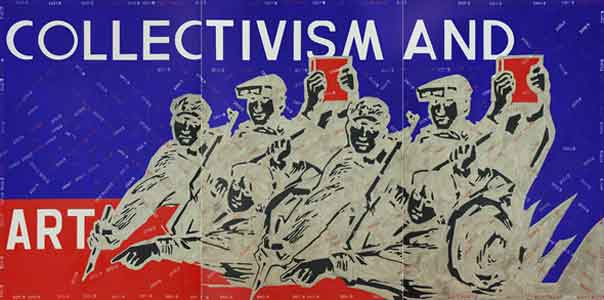ARTEXT : La Biennale di Venezia
55 Esposizione Internazionale d'Arte
Arsenale Novissimo - Tesa Nappa 89
PASSAGE to HISTORY
Chen Xi, Cui Xiuwen, Fang Lijun, Li Qing,Liu Wei, Liu Xiaodong, Mao Xuhui, Sui Jianguo,
Wang Guangyi, Wang Jianwei, XuBing, Yan Peiming, Ye Yongqing, Yin Zhaoyang, Yue Minjun,
Zeng Fanzhi, ZhanWang, Zhang Peili, Zhang Xiaogang, Zhou Chunya
"... As director of the 1993 VeniceBiennale, I brought to the West and to the LagoonCity a considerable number of Chineseavant-garde artists who throughtheir works demonstrated that they hadcrossed the Great Wall of Chinaand established a dialogue withWestern artistic movements. The exhibition in questionwas followed by others,like the one on the island of San Servolo, titled A Gift to Marco Polo, furtherconfirming that artdisdains seclusion, but is open toconfrontation and debate.
In the spanof twenty years from 1993 to 2013, it can be verified that Chinese art hasundergone transformation and its research has liberalized as the political regime has grown increasingly flexible. In fact, a great deal of research has opened up along many fronts, such as figuration, abstraction, video,performance and photography all of them starting onlyin 1989, when theNational Art Museum of China in Beijing staged the first exhibition of the Chinese avant-garde, highlighting two trends, named Cynical Realism (popi)and Political Pop (zhengzhi popi).
Cynical Realism entails the expression of a present without a future, the need for humor, and a movement away fromdaily reality.
Political Pop, in turn, depictsurban civilization, the consumerism of big cities,and the nation's history, all from a new point of view, without any rhetoric.
Both elementswere, at any rate, present in their artists works that provided an answer ofopulence to the progressive impoverishment of a planetdestined to a safeobscurity.
Obviously their hope was to liftus from the envisaged condition, a doomsealed in a progressive paralysis, depicted at that moment as being scientifically conclusive.
But if, a few decades ago, it wasonly art that invited us to the surprise of itsunpredictable and unexpected forms, nowadays telematics with its kleptocratic blurof various languages seems to have developed a dazzling and astonishing show. This is well documented by the works ofthe most recent generation of Chinese artists, who are about to attend the 2013 VeniceBiennale, bringing new proposals of cultural nomadism and stylistic eclecticism.
That surprise derives from the assumption of differentart forms in terms of pure surface, creamed off the very utopia of the artitself. If art temptsthe audience towards a movement of problematic knowledge and discovery, communicationtechnology favors, instead, the spectator's immobility and domestic sequestration, because of the pervasiveness of its invasion.Yet theconsumption of such spectacle is resuming as an alternative of strugglingagainst the trend to entropy - hence, the need for a productive activism of new proposals andprogressive blunders. Blunder is not the result of surprises. It is rather theeffect of an artificial construct, of a cage that places the audience in a horizontal and obsessively passivecondition.By symmetry, the artifice not unexpectedly isreinforced by the use of a chemical that develops physical strength granted bythe repetition of sound. Young people are the real users of this kind of drug;their theatre is the mass-disco where the sum of numeroussolitudes is fenced.
Surely, in the Chinese artisticactuality there is a recovery not only from a sociological point of view ontoday's reality dominated by the economy and the industrial development ofbig cities but also the selection of a new subjectivity, that can be presented throughgrotesque figuration and style, as well as through the corresponding use of an Eastern vision of the world." (A.B.O.)
[...]
Curatore : Lü Peng, Achille Bonito Oliva.
Artista : Chen Xi, Cui Xiuwen, Fang Lijun, Li Qing,Liu Wei, Liu Xiaodong, Mao Xuhui,
Sui Jianguo, Wang Guangyi, Wang Jianwei, XuBing, Yan Peiming, Ye Yongqing, Yin Zhaoyang,
Yue Minjun, Zeng Fanzhi, ZhanWang, Zhang Peili, Zhang Xiaogang, Zhou Chunya
Web site: http://www.chengdumoca.org/en/index.html |

